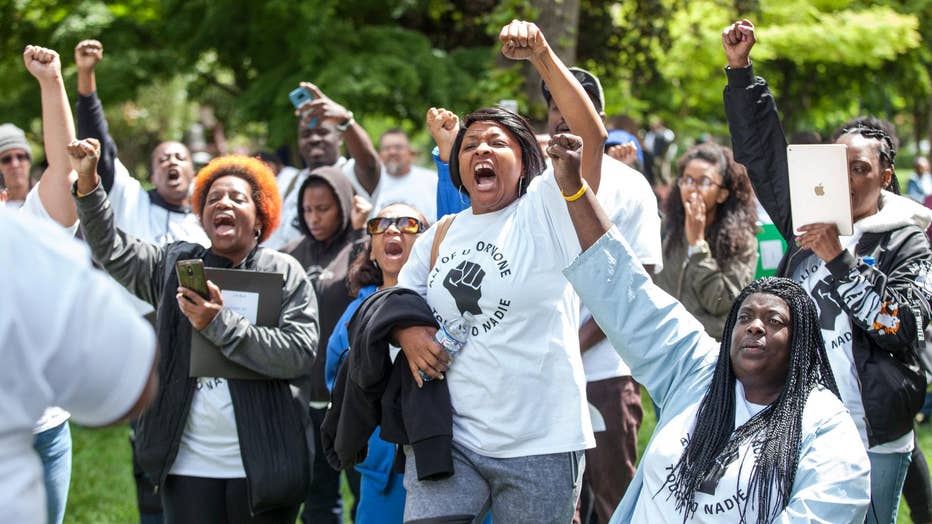Oakland non-profit fighting to give incarcerated people a voice
Oakland non-profit fighting to give incarcerated people a voice
A non-profit group in Oakland says its focused on building a movement. Legal Services for Prisoners with Children says it organizes communities impacted by the criminal justice system and is fighting for the human and civil rights of incarcerated people and their families.
OAKLAND, Calif. - There is always a hum of activity inside this building on Market Street in Oakland. For Robert Bowden this place and this job is a new chapter.
He was first incarcerated at the age of 12, but said he would spend the next 26 years in and out of prison.
He said at first it wasn't too bad, but then, "It became miserable, then it became confusing because I became institutionalized. The person that my family wanted me to be, I became that person inside. I was getting the education. My skin was clear. You know, my spirituality was intact. But I couldn’t transform that routine back into society when I got out. And that was what was so confusing, because, you know, that's the recidivism cycle, I continued. You know, coming in and out."
Now he is the recipient of the Elder Freeman Fellowship and works at the nonprofit known as Legal Services for Prisoners with Children.
Many of the people that work alongside him understand his journey.
Eighty percent of the employees are formerly incarcerated. - collectively, the time served is over 200 years.
Deputy Director Paul Briley said, "Legal Services for Prisoners with Children became one of the first organizations in the country specifically formed to support women in prison at a time when their struggles were nearly invisible. This was back in 1978, at the height of the women's rights movement, but during that time incarcerated people were not included in the conversation."

LSPC has now expanded its reach to the entire incarcerated population. It is the only public interest law firm run by a formerly incarcerated person, and 45 years after its founding, the group has expanded from legal services to community events, from bike giveaways to children with incarcerated parents to rallies and advocacy in both the judicial and political realms.
This is a population they say needs to be a part of conversation of Black history. "When people think of Black History Month, it's about the challenges and struggles that our people have overcame, and we are still fighting a lot of those challenges and struggles to this day," said Briley.
According to LSPC there are more than 95,000 people currently incarcerated in California. African Americans make up 6% of California’s population but account for 28% of the incarcerated population. It is a group they say is often unseen, and unheard and yet the impact being made and being felt by prisoners is notable.
A recent two-year investigation by the Associated Press named ‘Prison to Plate’ found that the country's 2-million-person prison population is part of the national supply chain in what it calls a massive multi-billion dollar empire. Agricultural prison programs are just part of a system the investigation found prison labor was linked popular brands like Coca-Cola, Frosted Flakes and Ballpark Hotdogs and stores like target, Costco, and whole foods, - an accusation whole food denied.
The A.P, writes "the prisoners who help produce these goods are disproportionately people of color. Some are sentenced to hard labor and forced to work – or face punishment – and are sometimes paid pennies an hour or nothing at all. They are often excluded from protections guaranteed to all other full-time workers, even when they are seriously injured or killed on the job. And it can be almost impossible for them to sue. And it’s all legal,"
The ACLU says last year, over 65% of incarcerated people reported being forced to work in prison, doing vital jobs like firefighting and paving roads and estimates that prison labor generates and saves at least one billion dollars annually for governments and private companies.
"In this country, we celebrate ending slavery." says Briley, "However, slavery is still in the federal constitution, and the same way that slavery is parallel to involuntary servitude, the jails and prisons are comparable to plantations. So, our mission is to remove involuntary servitude from the constitution, and the leftover vestiges of slavery, voter disenfranchisement and all the things that still are present today from way back then."
With 30 LSPC chapters in 30 states that fight to change that is also is being waged in state legislatures across the country.
In California, the fight takes the form of ACA-8 -authored by Assemblymember Lori Wilson. It would amend the state constitution to prohibit slavery and involuntary servitude without exception. The group is also fighting for the right of incarcerated people to vote, to make a living wage, and it pushes back against stigmas.
"I believe the stigma is allowing one bad decision to determine their entire lifetime and be labeled as a criminal, a criminal, or labeled as a bad person," says Briley. "When oftentimes we learn from our mistakes and we should be afforded the opportunity to be able to redeem ourselves and be a contributing member of society without having all of these barriers that we have to overcome and make it that much harder for us to reintegrate and, you know, contribute positively."
For Bowden its about being a part of that contribution, in a way that uses experience, not as a hurdle but as an advantage to help change his own fate, and those of others have walked the same steps.
"So, to be able to come up, come and be a part of something like this" says Bowden, "makes you understand who you are. All soldiers have scars so if you do not you ain't never been to war."

